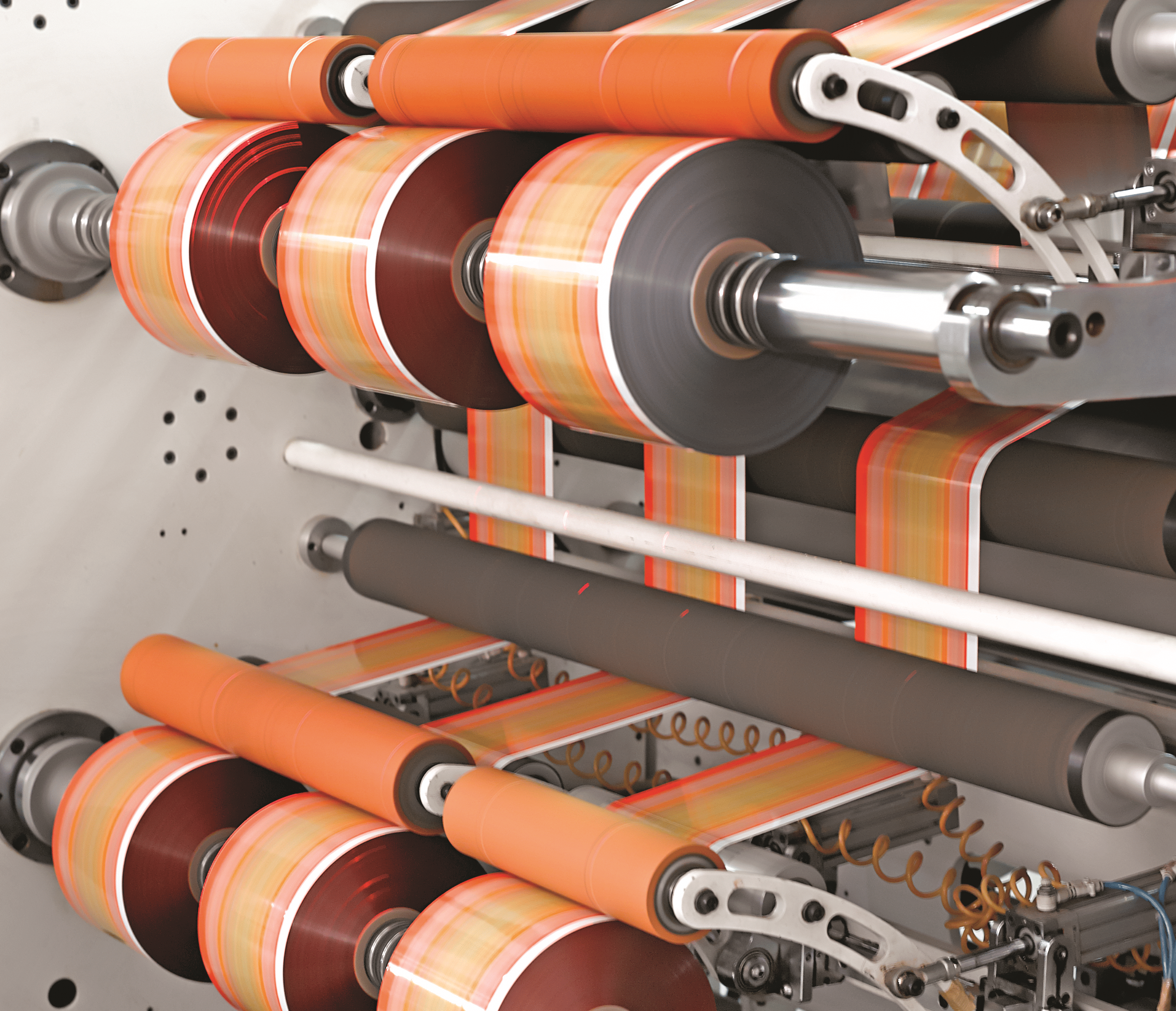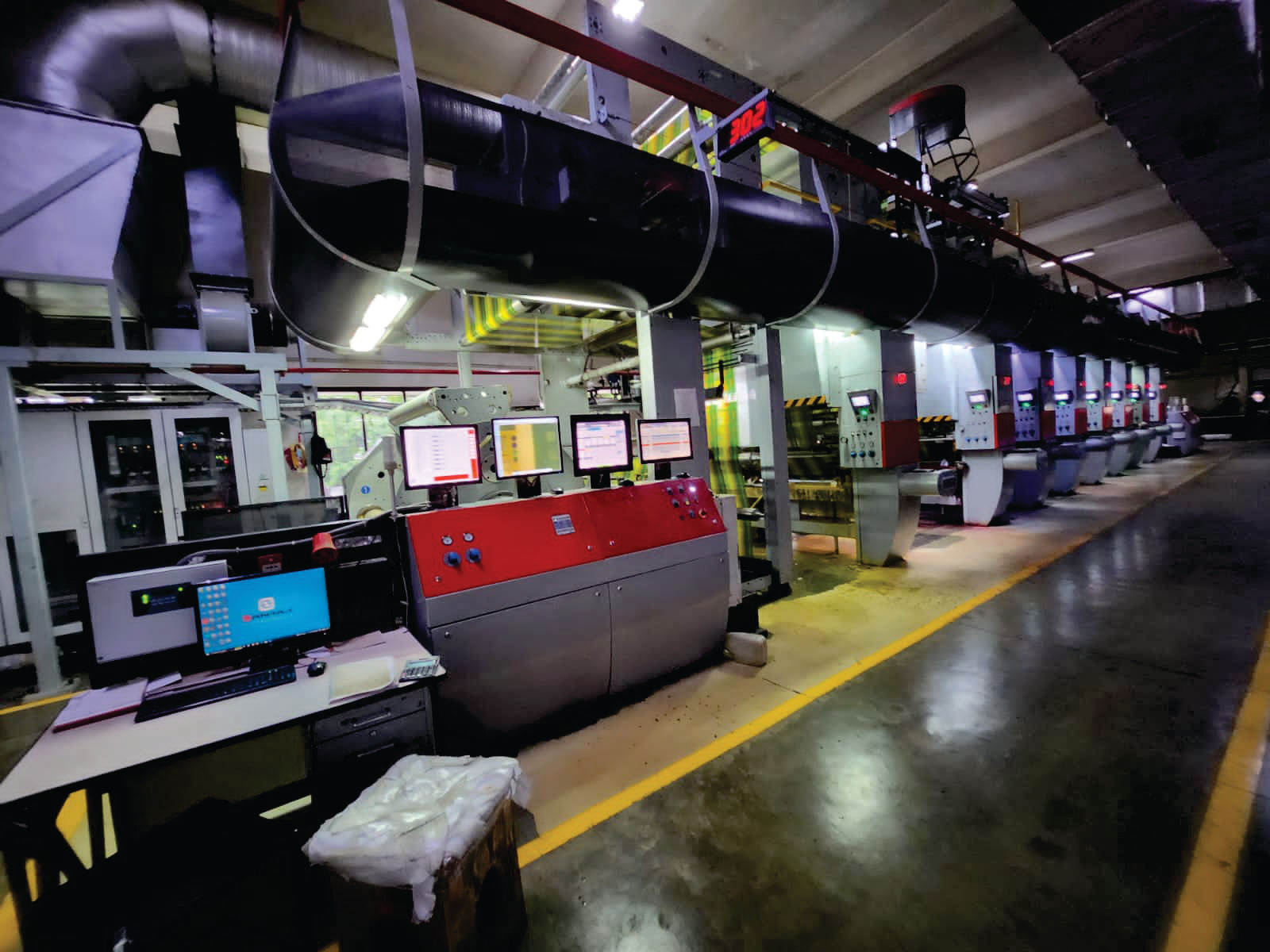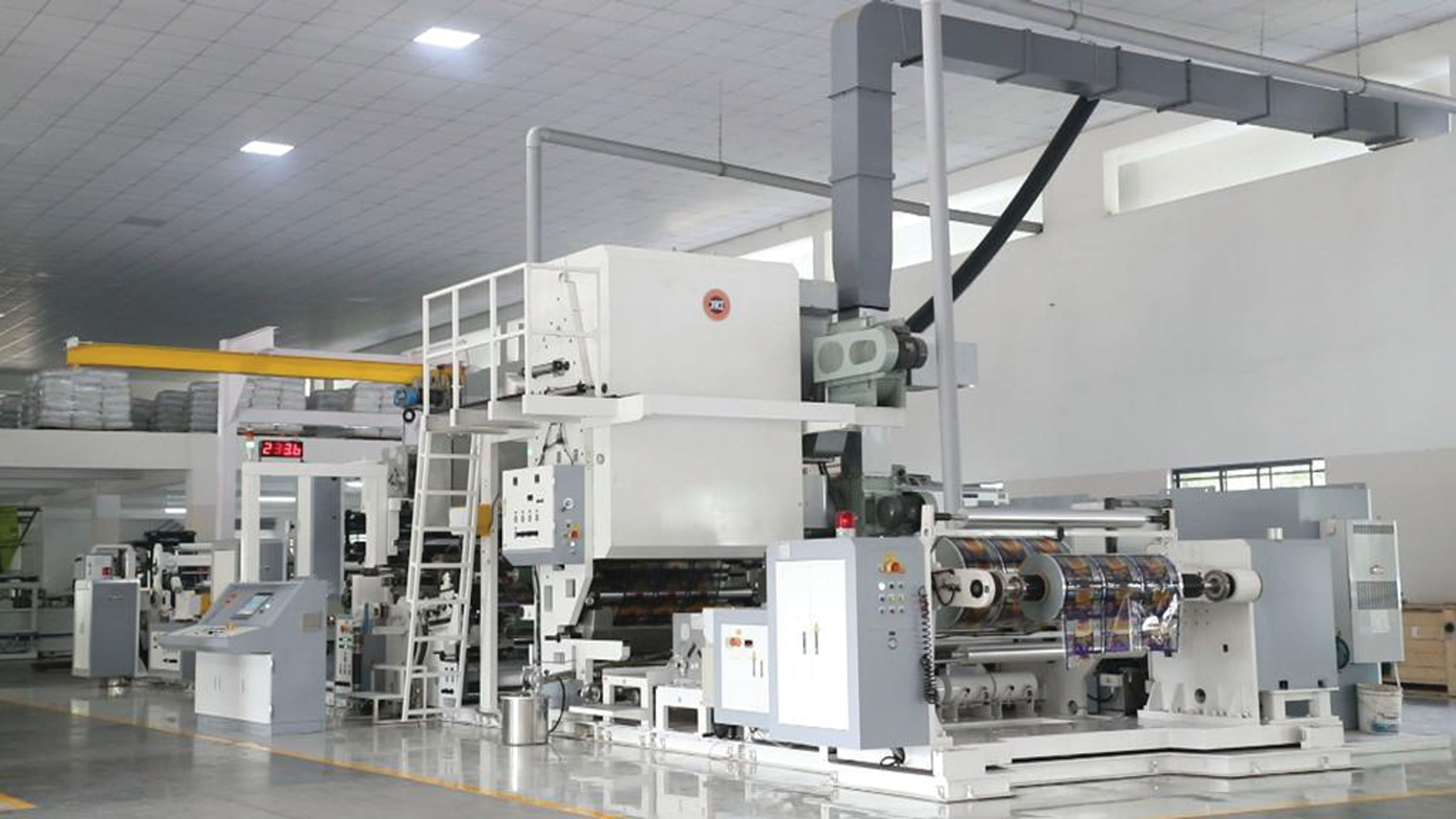Sanraj takes a packaging leap with NTNK inks to notch up Rs 350-cr
Sanraj Polyprinters is a mid-sized flexible packaging company based in Rajkot. The company's director Jayesh Kansagara spent time with Abhay Avadhani and Aditya Ghosalkar
16 Nov 2023 | By Abhay Avadhani & Aditya Ghosalkar
Almost everyone who is anyone in the packaging industry says, their USP is customer service. After serving the market for over 25 years, Rajkot-based Sanraj Polyprinters swears by the same mantra. That they have gained a deep understanding of the importance of anticipating customer demand. 52-year-old Jayesh M Kansagara, director at Sanjraj says, "We believe that it is essential for suppliers to understand customer needs even before they do."
It is this customer-centric approach which has transformed Sanraj Polyprinters into a trusted brand in the market.
The cantilever roll stacking and customised order planning software are two initiatives that back Sanraj’s customer approach.
Kansagara says, "Sanraj was the first in the industry to introduce cantilever roll stacking. This method allows for efficient storage and easy access to various types of rolls, reducing handling time and optimising workflow." Having implemented this advanced stacking technique, Sanraj can ensure a swift and streamlined production process.
Likewise, the customised order planning software helps in recognising the importance of effective order planning. Kansagara says, "We have developed our custom software which is tailored specifically to the industry." When prodded about the highlights of the software, Kansagara says, "It enables us to analyse customer demands, optimise production schedules, and allocate resources. By leveraging this cutting-edge technology, we can meet deadlines and ensure timely order fulfilment."
These initiatives are a testament to Sanraj’s commitment to providing service to its customers. Kansagara says, "We strive to stay ahead of the curve, anticipate market trends, and meet the evolving demands of our valued clientele."
To begin at the beginning
Sanraj's utilisation of an ERP system facilitates information sharing among its company members, fostering a paperless environment and a waste-free system. Sanraj has developed a paperless internal communication system through ERP. This system allows for real-time tracking of each and every roll at any stage of production The company has set aside a financial allocation to support the health of its employees and their families.
Today, Sanraj has a raft of rotogravure presses, each capable of printing up to eight colours. Two of these presses are electronic line shaft (ELS) presses, known for their precise control and high efficiency, while the remaining two are Mechanical Line Shaft (MLS) presses, which have been chosen for their reliability and performance.
In addition to the presses, Sanraj has two high-speed PE extrusion lamination machines and one PP extrusion lamination machine. Kansagara says, "These machines are specifically selected for their ability to produce high-quality material that meets the needs of the customers."
Kansagara says, “We operate round the clock, six days a week, with multiple departments working together to ensure smooth operations. The company has multiple departments including finance, marketing, HR and administration, IT, production, quality control, and stores. The Sanraj USP is that these departments collaborate and coordinate with one another to facilitate the efficient functioning of the company.”
As a result, the company’s annual turnover has notched up an impressive Rs 350-crore.

Sanraj Group has a strong commitment to the Make in India initiative; it employs Indian equipment plus Made in India-sourced raw materials
The Sanraj method
Even as we were writing this feature, Sanjraj was installing a brand new solvent-based lamination machine, which will replace their 10-year-old machine. In addition, there is an investment in a high-speed slitting machine which, as Kansagara says, "Will enable high speed and increase the production without increasing the cost."
The solventless laminator has already been installed and is in production. The new high-speed solvent base laminator with offline cold seal and registered window lamination facility is under trial.
Kansagara adds, "Sanraj is in the process of finalising a film line and a CI flexo printing machine, which shows our firm commitment towards sustainable packaging." He adds, "We want to ensure superior quality lamination, which the company has invested in high-speed solventless laminators and one solvent-based laminator with an offline registered cold seal application facility."
Also, the decision at Sanraj to have additional sets of cylinder shafts, ink pans, and drums has proven beneficial in terms of time savings during makeready. Kansagara says, "With these extra sets, the changeover process between print jobs has become much more efficient, reducing downtime and increasing overall productivity."
Operational efficiency, enhanced productivity
Kansagara shares an interesting insight about the standard make-ready time which is "approximately one hour". He says, "The main challenge arises when dealing with cylinders that have a circumference of 980 mm, which exceeds the press's maximum capacity of 800 mm." And so, to accommodate the 980 mm circumference cylinder, adjustments and settings modifications are required throughout the press.
When we asked him what Sanraj experienced in terms of savings on the press, he said, "The implementation of modified ink pans in our operations has proved to be advantageous. It has reduced solvent evaporation plus it has maintained the viscosity of inks." This improvement has contributed to consistent ink performance and minimised the need for adjustments during the print process.
Also, the decision at Sanraj to have additional sets of cylinder shafts, ink pans, and drums has proven beneficial in terms of time savings during make-ready. Kansagara says, "With these extra sets, the changeover process between print jobs has become much more efficient, reducing downtime and increasing overall productivity."
He continues, "The utilisation of pre-printed substrates for job settings has resulted in waste reduction. By using pre-printed materials for setup and testing purposes, we can minimise the amount of substrate wasted during the initial stages of a new job. This approach not only optimises resource utilisation but also enhances environmental sustainability."
Commitment to quality
Sanraj has established a laboratory within the premises. Kansagara says, "This lab allows us to conduct quality tests and measurements on our products." In addition to the in-house laboratory, Sanraj also collaborates with third-party laboratories that conduct tests on the products. Kansagara says, "These tests are performed at regular intervals to ensure that our products meet the required quality standards and specifications."

Renowned for its product quality, Sanraj has a raft of rotogravure presses
Kansagara adds, "We have implemented a system for continuous monitoring of the production process. This includes regular inspections and quality checks at various stages of production. By monitoring each step, we can identify any issues and take corrective actions to maintain high-quality standards."
The point is, Kansagara says, "Since we have a sales office in America we are aware of the hygiene standards required in the international market. We have installed a positive pressure air system which helps maintain ambient temperature in the plant and stops flies and other insects from entering our factory."
Sanraj prioritises training and skill development for its employees. Kansagara says, "We conduct regular training sessions to enhance their understanding of quality control techniques and ensure they are equipped with the necessary knowledge and skills to maintain and improve product quality.
Kansagara says customer feedback is a gift, it helps us identify areas of improvement and implement necessary changes to boost product quality. "When we start a project, my team and I spend time listening to customers. We built on their requests where it made practical sense. Customers love that. They have spread the word, and our growth has been solid and swift."
Standards and certifications
Sanraj Polyprinters LLP maintains a fully equipped quality control lab that conducts meticulous inspections of every roll sample to ensure compliance with established standards. Additionally, regular third-party laboratory testing is carried out on both raw materials and finished goods to uphold the set quality standards.
Sanraj Polyprinters LLP holds certification for ISO 9001:2015. Even as we were going to press, the company has obtained ISO 22000 and BRCGS certifications. Kansagara says, "This emphasises our dedication to food safety and meeting industry-specific standards. By investing in a well-equipped quality control lab and pursuing certifications, we strive to deliver products that meet the highest quality standards and adhere to strict food safety requirements."
It received certification by Alcumus ISOQAR after conducting an audit on the manufacturing of flexible films by gravure printing (up to eight colours), lamination (solventless/solvent base/extrusion), slitting, and pouching for use in food and non-food packaging. The certification states that Sanraj Polyprinters has received an A grade, and meets the requirements set out in the global standard for packaging materials.
Reduction of carbon footprint
Sanraj is an advocate of extended producer responsibility (EPR) and is committed to recycling plastic waste as per the guidelines issued by the Pollution Control Board of India. Kansagara says, "We encourage our customers to use environmentally-friendly packaging materials."
The group has a strong emphasis on environmental friendliness. This includes solar energy utilisation, wastewater treatment and a biogas project.
For this, Sanraj installed an 850-KW capacity solar electricity generation plant last year for green energy. This solar plant produces 103,500 units/month and reduces 869-MT carbon dioxide emissions per year. Also, the group has installed a sewerage water treatment plant with a capacity to treat 15,000-litres of wastewater every day. The treated water is used for watering the garden and plants on the campus. Kansagara says, "This saves around 5.4 million litres of freshwater per year."
Sanraj has installed a biogas production plant which produces cooking gas out of biowaste. It consumes around 200-kg of biowaste and produces 10-kg of cooking gas daily which is used in its pantry. And finally, Sanraj has shifted to NTNK inks since January 2023. Kansagara says, "We do not use toluene- or ketone-based solvents in our factory."
Kansagara says "We have a crystal-clear vision for the future of Sanraj which spans the next five years and beyond. Our team is forging ahead with a future-forward approach, ready to tackle any challenges along the way. With unwavering commitment and a focused mindset, the team is determined to shape tomorrow without anything holding them back."
He signs off, "Sanraj aims to be a go-to partner for brands who seek reliable and sustainable packaging solutions." The company's plans for the future include expansion and investing in advanced systems.
How did Siegwerk address packaging safety at the Sanraj factory

Ajay Tayde, vice president of flexible packaging, Siegwerk India shares the Sanraj journey of Siegwerk with PV725 (NTNK inks).
Ensuring packaging safety involves implementing a comprehensive set of practices and protocols, Sanraj’s commitment reflects a dedication to delivering safe and reliable products to consumers while upholding high standards of quality and hygiene. Siegwerk collaborated to ensure the safety of packaging at the Sanraj facility. The company provided guidance, education, training, and conducted regular compliance checks and certifications on food safety. It continuously upgraded their knowledge on topics like HM, Food Grade (IS:15495), EUPIA exclusion, SVHC, ROHS, and phthalates.
The journey began in Q4 of 2021. Sanraj was committed to packaging safety; and Siegwerk, as a market leader, assisted Sanraj in initiating the adoption of a toluene-free solvent-based ink solution. Team Sanraj was ready to comply with the regulatory and product safety requirements. Most of which are part of Siegwerk's commitment. It was a superb collaboration. Typically, we manage to fulfil all regulatory requirements within a few days.
Insights and challenges
One of the challenges is to stay informed about changing regulations, adopt innovative technologies to ensure safe, sustainable packaging solutions.
The USP at Sanraj is shop floor training. I feel this is essential to achieve optimal results. Siegwerk provides in-house support with one dedicated in-house expert and one troubleshooting and Process efficiency improvement tech service representative to assist with machine operations.
Siegwerk believes in educating and informing shop floor workers about inks, safe solvents, pigments, and other components.
Typically, this is a continuous process. Siegwerk offers training modules about global compliance trends, sustainability, and safe practices.
We believe knowledge updates are driven by brand owner requirements. Especially for NTNK Inks and LF Inks. Regulatory compliance largely aligns with government regulations.


